
Suicide is often reduced to statistics to give people a general sense of the scale of the problem. But statistics can’t possibly illustrate the toll of each individual loss.
If you have lost a loved one to suicide, you are intimately familiar with the devastating and complex impact felt by surviving friends and family.
Your loved one’s death may have left you feeling lost and confused, unsure of where to turn for answers. As you and those around you struggle to come to terms with the loss, it can be difficult to know what to do or how to feel.
There is no right answer for how you should be feeling following the suicide of someone close to you. Grief is complex, and it’s rare that any two people will experience it in the same way. Just know that whatever you’re feeling, it’s okay.
Accepting your grief and allowing yourself to feel it is easier said than done, but there are things that can help. Here are a few things that may help in your grieving process.

The most common question that survivors of suicide come to is “Why did this happen?”
After a loved one’s suicide it can be easy in your search for answers to begin blaming yourself.
You may wonder what you could have done to prevent this outcome or you might feel guilt over signs you may have missed. You may find yourself wondering why your support wasn’t enough to keep them around.
The truth of the matter is that suicide is complicated with no singular explanation for why it happens. However, a framing that may help you understand is this: At the end of all things, your loved one died of an illness.
Most, if not all, victims of suicide suffer from an acute mental illness that contributed to the decision to end their life.
Mental illness can severely distort a person’s perception of their importance in the world and the care of those around them. Your loved one did not choose to become ill, and they would not have chosen to end their life had their illness not been pushing them to do so.
Mental illness is treatable just as cancer is treatable—but some people still succumb to their cancer even with treatment, while others recover and go on to live for years.
You do not need to wonder why your efforts weren’t enough or what you could have done better. In the end, succumbing to their illness requires no more blame than if they had died from a heart attack.
Understanding this will not make the loss hurt any less, but it may help to reconcile some of the confusion so you can grieve more peacefully.

There is no timetable on grief, so it’s impossible to say how long it will take for your life to begin to feel normal again.
There are, however, some things you can do to aid in your recovery process and ensure you are on the best possible path toward healing:
At the heart of all of these is connection with other people. You are not required or expected to do this alone. While you may occasionally need some time to yourself to process, it is support and connection with others that will be the most help in getting you through this difficult time.

After a traumatic loss, the idea of moving on can be scary. If you’re struggling with the transition, volunteering your time to a cause dedicated to preventing suicide and supporting survivors like you can help to ease some of the guilt and fear.
There may still be bumpy roads ahead. Grief is complicated and can come in waves. However, as you start feeling a little more whole you will be able to give yourself permission to begin living again.
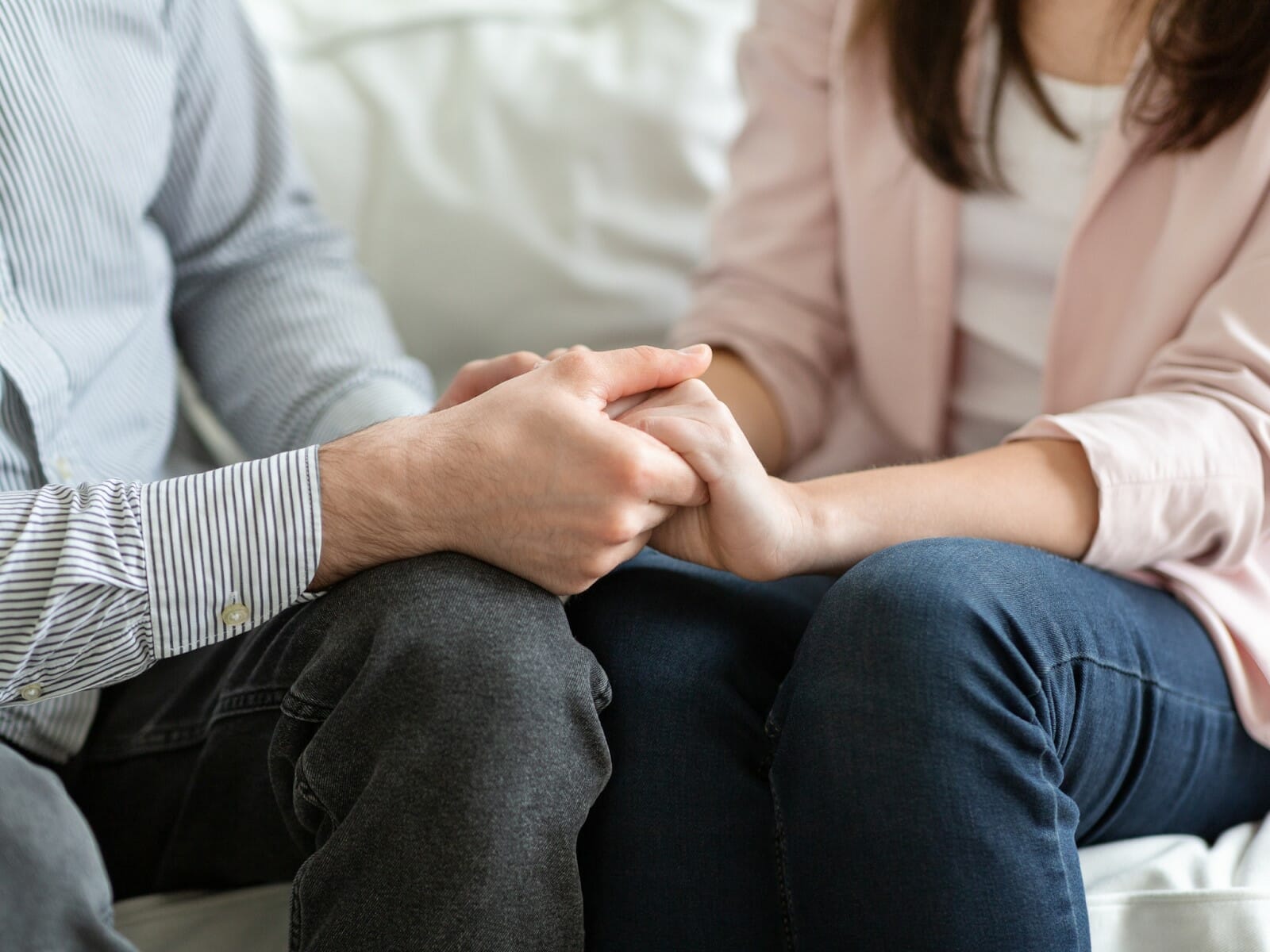
Suicide is a difficult topic most people prefer to avoid altogether. Our societal aversion to the topic means most people don’t know what they need to do if the unthinkable happens.
Unfortunately, in spite of the best efforts of many, suicide happens. This leaves surviving loved ones to navigate a confusing and difficult healing and cleanup process.
Many resources offering help following suicide launch right into how to cope with grief. But if you are still in the phase of trying to manage the logistics, you may be looking for different information.
As a biohazard cleanup company, our work at Bio-One often involves families coping with the loss of a loved one to suicide. Because of this, we strive to do our part to help by providing some helpful information for navigating this difficult time.
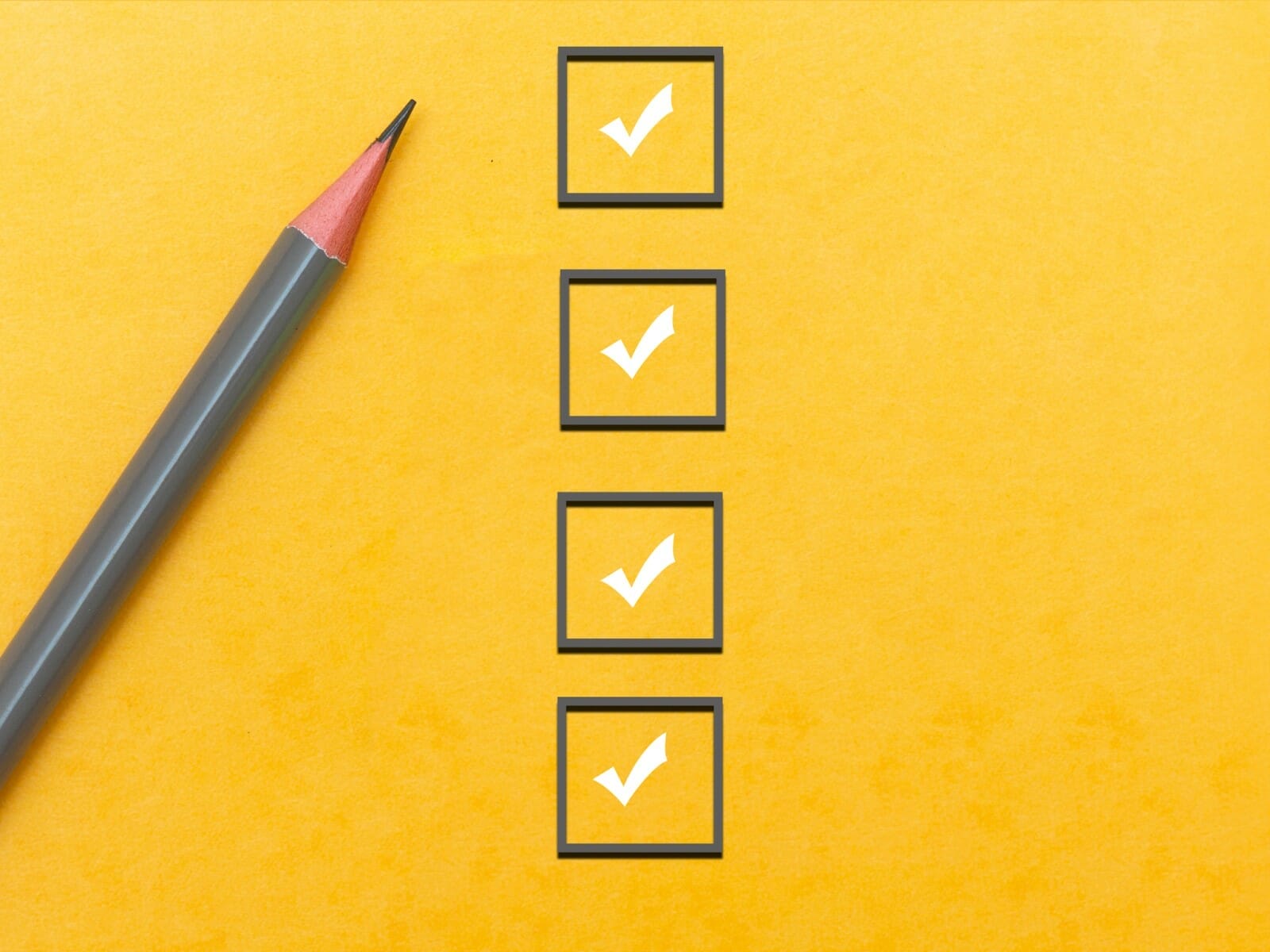
If you are here because you need information, it’s likely you’ve already contacted emergency services about the death. After the police, coroner, and/or medical examiner have released the scene and your loved one’s body has been transported to a medical facility there are a few things that need to happen next:
Suicide cleanup is a job that should be entrusted to professionals. If you are currently in the position of needing to arrange for cleanup, please contact Bio-One right away at 303-625-6543.
We have all the equipment and expertise needed for the job, and we will treat the scene, the situation, and any belongings with respect and care. We will also help you to get the insurance process underway to get cleaning costs covered by your homeowner’s insurance. Through this difficult and traumatic time, this is the last thing you should have on your plate. We are here to help.
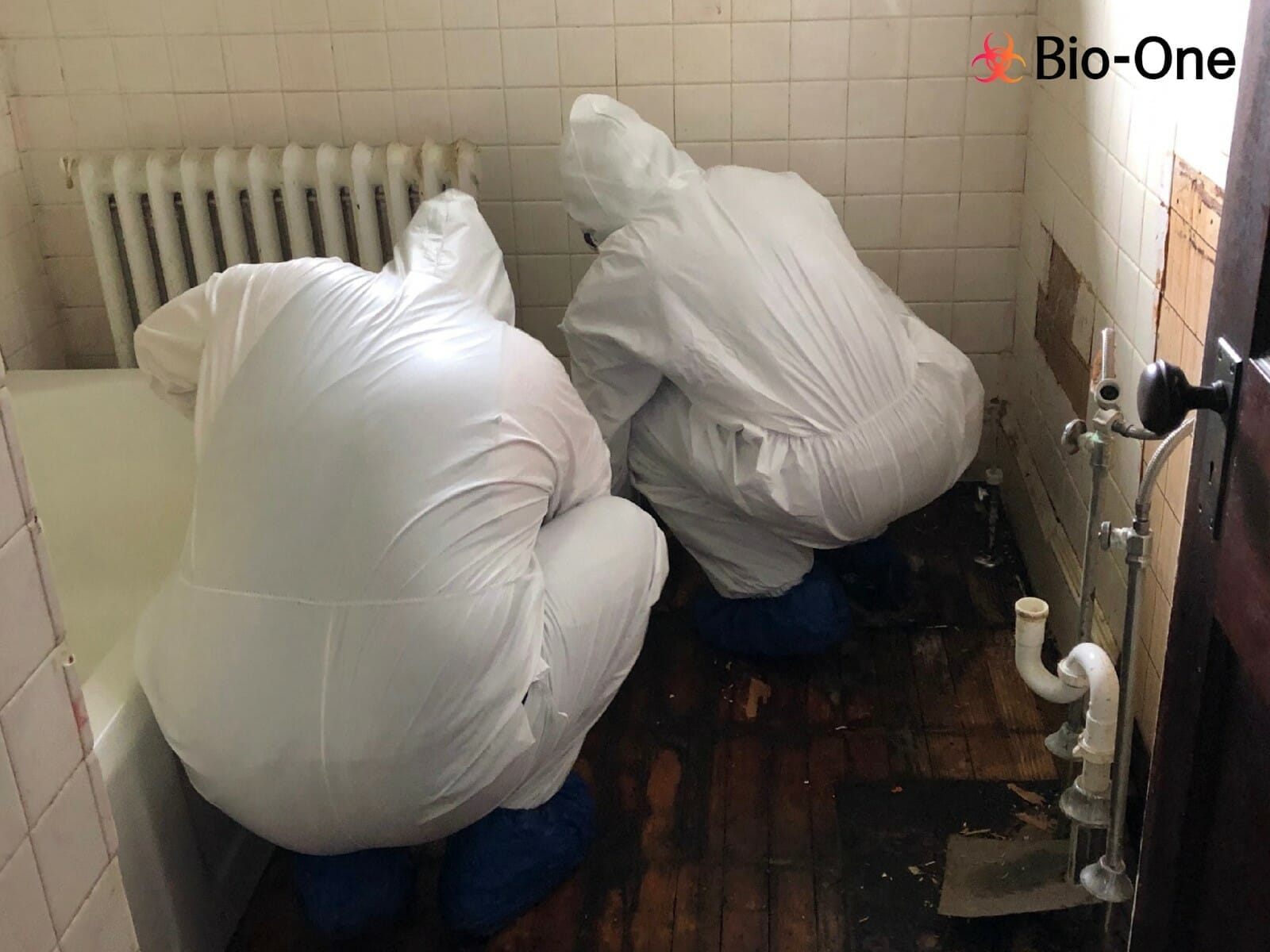
Even though you are not participating in the cleaning itself, understanding what’s involved can be an important part of the grieving process. Some people may need to know exactly what is involved in cleaning up the scene.
The time required for a clean-up and the extent of what’s required can vary depending on how much bio-matter is left at the scene and how long the body was there. Bio-One has a tried-and-true process to restore the scene to a safe and habitable state in a way that is both thorough and respectful.
Our process is as follows:
We hope these details will help to take some weight off your mind during this difficult time so you can focus on any preparations you need to make.
With cleaning out of the way, your remaining responsibilities may focus on informing family and friends and/or making funeral arrangements. Be sure to take care of your own mental health as you take the next steps. You are going through something very painful, but hopefully the help from your family, friends, loved ones, and community will ease some of the stress.

Bio-One is here for you as you weather this tragic time. We hope our service will help ease your burden. Though the circumstances may be difficult, we are honored to be a part of your community at this incredibly challenging time.

One of the most difficult parts about realizing you may be suicidal is feeling like you can’t talk to anyone about it.
Whether out of shame, or fear of how a loved one will react to finding out, reaching out to someone you know for help can be incredibly paralyzing. This sense of isolation can be dangerous, especially in moments of crisis.
In these discouraging and frightening moments, the 988 Suicide & Crisis Lifeline is there.
The 988 Suicide & Crisis Lifeline is a free resource anyone experiencing a crisis can contact for help.
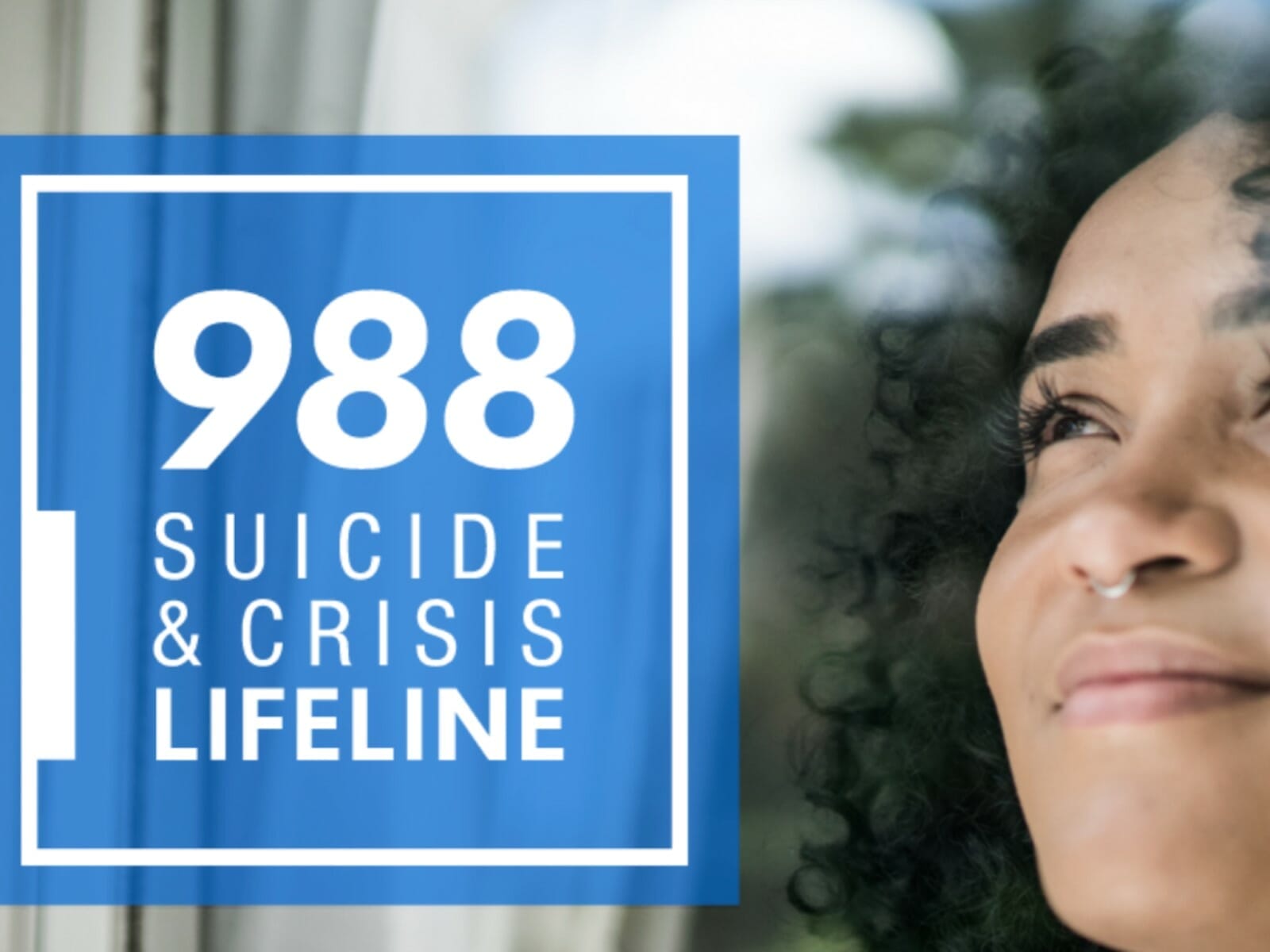
The Lifeline connects people with skilled crisis counselors who listen and provide immediate support to guide you through the worst of your distress. They can also refer you to resources to help you keep yourself safe in the long term.
The Lifeline is funded by the Substance Abuse and Mental Health Services Administration (SAMHSA) as part of its ongoing mission to reduce suicide rates nationwide.
They work with many local and government suicide prevention organizations to extend their reach everywhere in the United States.
Contacting the Lifeline is as simple as calling or texting 988.
The 988 Lifeline is for anyone who is thinking about suicide, concerned for a friend or loved one, or just in need of emotional support. This means you can call, text, or chat even if you are struggling but not yet in crisis.

People call the Lifeline for any number of reasons:
These are just a few concerns that may prompt someone to call, but they should illustrate that you don’t need to wait until you’re in severe distress to call.
988 is a crisis service, but not an emergency service. This means if you are in emotional distress but aren’t yet in danger, it is the right time to call. 988 counselors are well-trained in methods to help you steer out of an emotional spiral and ground yourself.
If you or the person you are helping is in immediate danger of harming themselves, call 911 right away.
There are a few different ways you can contact the 988 Lifeline depending on your needs. You can call or send a text to 988, or you can chat with a counselor online at 988lifeline.org. Help is available in English or Spanish, and there are additional options for ASL speakers.
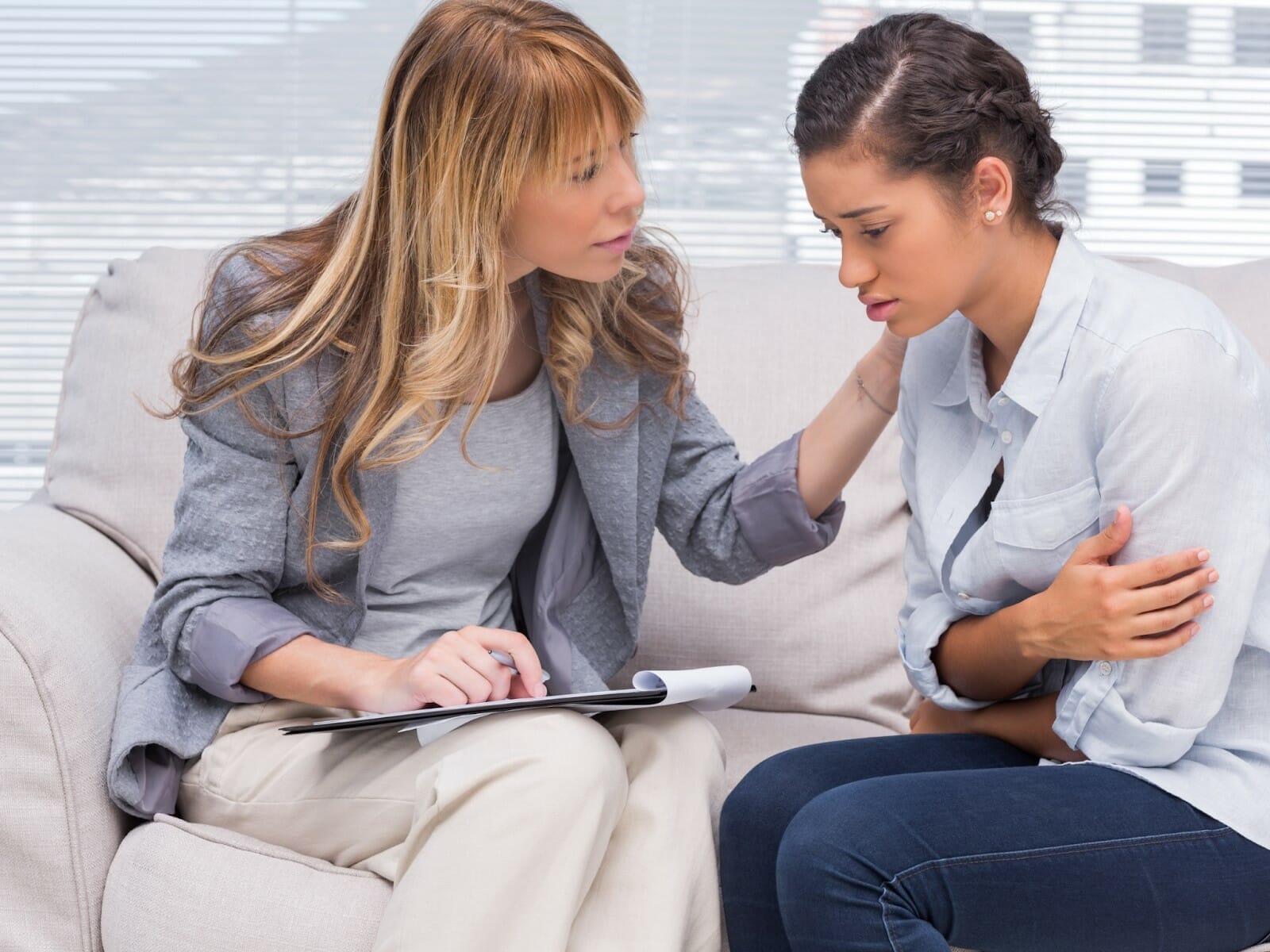
Depending on how you choose to contact the Lifeline, here is what you can expect from the process:
If you call…
You will be greeted by an automated message and a phone tree. If you are a veteran, you can press 1 to be directed to the Veteran Crisis Line. For help in Spanish, you can press 2. Otherwise, you can remain on the line and you will be placed on a brief hold while you are connected to a counselor.
If you text…
After you send a text to 988 requesting help, you will receive a short survey to let the counselor know a little about your situation. After you respond, the text line will connect you to your counselor who will instruct you further.
If you chat…
Similar to the text line, you will receive a short survey asking about your situation so your counselor knows how to help. There will be a short wait time while you are connected, and then your counselor will instruct you further.
Regardless of how you reach out, once you are connected to a counselor, they will listen to your problems and ask you questions to figure out the best way to help you. If needed, they may offer you steps to help you interrupt a panic attack or work your way out of a thought spiral.

Counselors may also walk you through some steps to keep yourself safe until the crisis has passed. Once they have seen to your immediate needs, they may direct you to resources online or in your community to help you find ongoing care for your mental health concerns.
The 988 Lifeline is always free and always confidential, so you never need to worry about reaching out.
Suicide is on the rise and is one of the leading causes of death in our country, but it can be prevented. The 988 Lifeline is making huge strides in prevention efforts by providing people a place to turn when they feel hopeless.

Studies have shown that almost 98% of people who contact the 988 Lifeline are able to work through their crisis without needing emergency services. Having somebody to talk to can make all the difference.
—
Whether it’s yourself or a loved one, a suicidal crisis can be a scary thing to navigate. That’s why we at Bio-One hope this guide will help you know how to intervene to keep yourself or the people you love safe.
Part of our mission is to provide community resources. That’s why we dedicate so much of our time to projects like this. We want to create a future where we never have to answer another suicide call again.
If you or someone you know may be considering suicide, contact the National Suicide Prevention Lifeline at 1-800-273-8255 (en español: 1-888-628-9454; deaf and hard of hearing: dial 711, then 1-800-273-8255) or the Crisis Text Line by texting HOME to 741741.

According to the American Psychiatric Association, suicide is the 10th leading cause of death in the United States and the second leading cause of death (after accidents) for people aged 10 to 34. And according the CDC, published reports from 2020 suggest that the pandemic has had a negative effect on children’s mental health.
“Beginning in April 2020, the proportion of children’s mental health–related ED visits among all pediatric ED visits increased and remained elevated through October. Compared with 2019, the proportion of mental health–related visits for children aged 5–11 and 12–17 years increased approximately 24%. and 31%, respectively.”
Researchers have yet to link recent suicides to the pandemic since 2020 suicide data is not yet available. But on the ground, there's growing concern.
The February 2021 NPR article “Child Psychiatrists Warn That The Pandemic May Be Driving Up Kids' Suicide Risk” explores possible correlation. Takeaways include:
For ways to help kids at risk, NPR encourages readers to read Part 2 of their story, “Make Space, Listen, Offer Hope: How To Help A Child At Risk Of Suicide”.
Suicide Prevention Resources
Survivors of Suicide – What to Do Next
The loss of a loved one by suicide can be a deeply painful and traumatizing experience; however, it’s important to know that everyone experiences suicide loss in their own way. As you begin the process of healing, consider reading the American Foundation for Suicide Prevention’s guide for to talk to others about what happened and identify ways to take care of yourself.
Additionally, if you have lost someone to suicide, there may be a cleanup required. There is no need for family or friends of the loved one to be further traumatized or overwhelmed with trying to figure out how to clean the impacted area. Bio-One is here for you. Learn more about Bio-One’s suicide remediation services.
If you or someone you know may be considering suicide, contact the National Suicide Prevention Lifeline at 1-800-273-8255 (en español: 1-888-628-9454; deaf and hard of hearing: dial 711, then 1-800-273-8255) or the Crisis Text Line by texting HOME to 741741.
Suicide effects people of all ages and doesn't always mean someone is mentally ill.
Look for warning signs. People who consider suicide as an option often talk about feeling hopeless or lost. Sometimes they try to organize their life as if they are creating a will by giving others their belongings or saying goodbye. They can experience strong self-hatred and be withdrawn from social interactions.
If you know someone displaying more than one of these signs, take the time to help. Sit down and talk to them about what's going on. Advocate for professional help if needed.
National Suicide Prevention: 1-800-273-TALK (1-800-273-8255)
If you know of someone in need of our services, please take a look at our locations to find the nearest Bio-One office near you. Stay safe!
Although you can't always tell if someone is suicidal, there maybe some signs you can learn to recognize especially if you notice more than one.
Warning Signs
If you or someone you know display one or more of these warning signs, take the time to talk and evaluate. It's worth it. If it's an emergency, call the National Suicide Hotline 1-800-273-8255
When a suicide occurs, it affects more than just the family. While the family is feeling it the most, a suicide can actually trickle out to the entire community.
Friends and loved ones are hit hard. Co-workers, caregivers and teachers can be in the next level of those affected. Some people may not have had the same amount of interaction, but these people may feel a sadness or loss that is stronger than we might expect. The truth is, when someone is lost through suicide, it creates a wave that has a far and powerful reach among the community.
You may not always be able to know who is suicidal, but you can be kind and know that everyone is fighting battles you can't see.
If you or someone you know might need a support group, please find the link below that best suits your needs.
Save - Suicide Awareness Voices of Education
Alliance of Hope - for suicide loss survivors
AAS - for suicide loss survivors
If you find yourself looking at a crime scene, your initial reaction may be to clean it yourself. You may want it to be gone as soon as possible and that's completely understandable. Here's some reasons why you shouldn't do that.
1. Fluids! Coming into contact with bodily fluids, especially blood, can be harmful. It can carry disease and pathogens that you just don't want on or near your body!
2. Invisible to the eye! If you don't take care of all of it, you can still recieve harmful effects. This means if you try and clean it and leave behind any traces of the scene (even germs and pathogens you can't see), your home won't be as sanitary as you think it is. You know how they say won't you don't know won't hurt you? Well in this case, it can.
3. Don't stress! While you may be worried that you can't afford crime scene cleaners, your insurance will usually take care of it! Don't let this detail keep you from getting the professionals in the door!
Never try to clean a crime scene yourself! You'll be happier, more sanitary, and less stressed when you let the professionals come take care of it. View our Bio-One locations if you need help.
Many people think suicide rates increase during the winter holidays. This still happens, however, CDC’s National Center for Health Statistics reports that the suicide rate is, in fact, the lowest in December. The rate peaks in the spring and the fall. While there are varying factors for why this happens, what we need to focus on is keeping in contact with our loved ones and those around us. If someone is acting in an unusal manner, check in with them. See if there is something going on that you might be able to help with. A lot of times people struggle with self love or self help and they just need someone to show they care.
If you are feeling depressed yourself, start making note of what's going on emotionally. Write down how you feel that day and what is causing your mood to change up or down. Keep track of changes in feelings and thought patterns. Perhaps you're lashing out at people more or feeling unusually overwhelmed and you can't figure out why. If these things continue to happen, talk to a friend or specialist. There may be an underlying issue that you can work out easily or that might need more support. There is always a way to fix it, you're not alone.
If you feel the need, contact the National Suicide Prevention Line 24/7
If you know of someone in need of our services, please take a look at our locations to find the nearest Bio-One office near you. Stay safe!